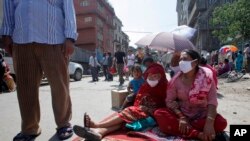International organizations and non-governmental groups are worried about the safety of girls and women in Nepal. A powerful earthquake on April 25 and other strong quakes since then have left widespread damage. Some observers say the events of the past few weeks have made thousands of Nepali girls and young women targets for human traffickers.
Hundreds of thousands of people in Nepal are living without shelter or possessions. Activists say the recent earthquakes have left poor women and girls weak and vulnerable to human traffickers. Health workers say the traffickers promise jobs and money, but do not give the girls and women either.
Non-governmental organizations, or NGOs, say the criminal organizations are targeting the country’s rural communities. They say some of the groups are using humanitarian activities to hide their true intent – to kidnap women or trick them to move away.
A woman named Anuradha Koirala created the anti-trafficking organization Maiti Nepal.
“All the areas which have been affected, these are the areas which have been affected very badly and where 80 percent of the children are trafficked. Very few people are concentrating on this issue. We think these children are most vulnerable, we have to save them and we have to take care of them. We have ourselves have already rescued three children.”
The United Nations says as many as 15,000 girls are trafficked each year from Nepal. Many are forced into sex work in countries as far away as South Korea and South Africa. Most of the young women, however, are sent to India to work in brothels -- places where men pay to have sex.
The United Nations Children’s Fund is calling for the creation of temporary places for learning. It says almost one million Nepalese children cannot return to their schools because of damage to the buildings. Officials estimate 24,000 classrooms were damaged or destroyed in the powerful earthquake last month. The UN agency says more than 90 percent of schools were destroyed in some places. In other areas, schools are being used as emergency shelters for earthquake survivors.
Anuradha Koirala says officials should work to rebuild the schools and tell people in rural areas about the threat from traffickers.
“Our focus should be on reconstruction. The reconstruction of the schools first, and education should be free, compulsory. The full international community we should get together and work on the prevention – prevention and protection of girls and children who have been survivors. At the same time, we should take prevention programs, awareness programs to the villages because then only people can be aware and I think we can minimize trafficking.”
A report by the United States government says Nepali women and girls are often forced to work as housekeepers in Nepal and India. It says others are employed in factories or mines. Some find work in the adult entertainment industry. While others, still, beg on the streets, or ask people for money. Others are sent to Malaysia, Hong Kong, South Korea, and even the nearby Chinese district of Khasa.
The U.S. State Department report says Nepal has failed to meet what it calls “the minimum standards for the elimination of trafficking.” But it said major efforts were being made by Nepalese officials to stop human trafficking. But anti-trafficking activists fear that whatever progress was being made will stop because of the earthquake.
I’m Anna Matteo.
Ron Corben reported on this story from Bangkok. Christopher Jones-Cruise adapted it for Learning English. George Grow was the editor.
______________________________________________________________
Words in This Story
vulnerable – adj. open to attack, harm or damage; easily hurt or harmed physically, mentally or emotionally
trafficker – n. a person who buys or sells something illegally, such as drugs and human beings
intent – n. the thing that you plan to do or achieve; an aim or purpose
brothel – n. a building in which sex workers are available
compulsory – adj. required by a law or rule
minimize – v. to make as small as possible
Is human trafficking happening in your country? If so, how are officials fighting it? We want to hear from you. Write your thoughts in the comments section.





